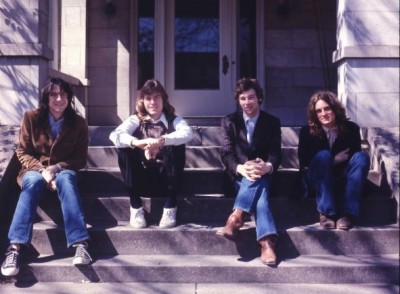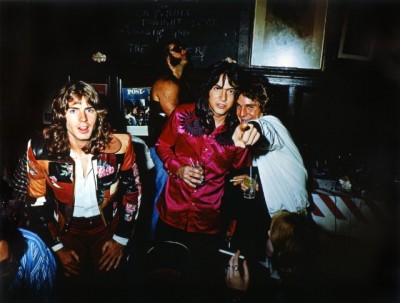
I have to preface this review by mentioning that I’ve never been a huge fan of Big Star. I like their music, but have never been enamored with them to the point their cult status demands. Because of this, I’m obviously not the target audience for Big Star: Nothing Can Hurt Me, the documentary that attempts to trace their days as obscure Memphis critical darlings in the ‘70s to the revered, influential band they’re seen as today. This exclusivity is inherent in the material, since it’s a rarity for the Average Joe to love anything as much as a documentary filmmaker, a person who loves something enough to dedicate months and years of their lives to telling its story. On top of this, if you’re already a self-identified Big Star fan, you’ve likely already bought your ticket, and nothing I say about the film will change what you think of the movie, let alone the band.

That being said, looked at as filmmaking, Nothing Can Hurt Me is your basic music doc. My personal high watermark for music docs will likely always be The Who’s The Kids Are Alright (1979), a movie painting a picture of a band’s career through little more than concert and TV footage. There’s little of that inventiveness here, with zero deviation from the standard music-doc formula, showing the band as they form, struggle, implode and eventually move on, all while their popularity and reverence slowly grows. The film consists almost exclusively of talking-head interviews, a bevy of old photographs and a surprising lack of archival footage (though the band’s lack of mainstream popularity likely has a lot to do with this).

Inherently, it’s a fascinating story of overlooked genius, but directors Drew DeNicola and Olivia Mori spend too much time trying to convince everyone of Big Star’s greatness, occasionally falling into fits of hyperbole. On top of this, their great weakness as storytellers truly damages the film. Aspects of the Big Star story — like member Chris Bell’s departure from the band — are confusing and muddled. The film’s painstakingly and impressively researched, but there’s almost too many interviews and too much information. DeNicola and Mori are perhaps too close to the subject and don’t know what to cut — a frustrating point in a 110-minute movie. Too often, Nothing Can Hurt Me reminds me of an old Kids in the Hall skit about a dead vaudeville performer, in which they interview people like “an old guy who used to watch a lot of TV.” There are times where the film simply wanders and the meat of the story is lost. Nevertheless, there are moments—specifically in interviews with Bell’s family — that DeNicola and Mori go beyond music and touch on the humanity of Big Star’s members, and it shows you what the documentary could’ve been. These flashes are there, though often difficult to find, but for those who love Big Star, this will hardly matter. Rated PG-13 for drug references and brief strong language.
The Fine Arts Theatre will screenBig Star: Nothing Can Hurt Me Thursday, Aug. 22, at 7 p.m.




I thought “The Kids Are Alright” was some kind of music opera?
I was really wanting to see this but i think im going to hold off and come to Asheville Friday, and see a new release instead.
I’ve seen countless rock documentaries, and probably the best of the bunch, hands-down, is Tom Petty: Running Down a Dream. Puts all others to shame.
I thought “The Kids Are Alright” was some kind of music opera?
You thought wrong.
I was really wanting to see this but i think im going to hold off and come to Asheville Friday, and see a new release instead.
Near as I can tell, this is a new release.
the best of the bunch, hands-down, is Tom Petty: Running Down a Dream.
Might depend how much you like Tom Petty, too. That’s a pretty big factor in these things.
Sure; it’s not that I am personally a big TP fan (I like him well enough), but that the documentary is extremely well done and genuinely interesting, regardless of whether one is a fan of his music or not.
If I didn’t like The Who, I most likely wouldn’t care about The Kids Are Alright.
Sure; it’s not that I am personally a big TP fan (I like him well enough), but that the documentary is extremely well done and genuinely interesting, regardless of whether one is a fan of his music or not.
The problem is that I don’t like him well enough. I can tolerate his stuff as a Willbury, but that’s about it. This is kind of like the fact that I’m sure Martin Scorsese’s The Last Waltz is everything that it’s claimed to be, but I seriously don’t like The Band, so I find it an unpleasant experience.
Well, I’m with you as far as The Band goes; I just couldn’t get into them, although a few of their songs were pretty good back in the day. As for The Last Waltz, I found the interviews and comments by the band members of some interest, but aside from Eric Clapton and Neil Young, I never cared much for it.
THE LAST WALTZ is often my favourite movie.
Yes, well…
The niiiight they wore Ol’ Hanke Down…
The Devil and Daniel Johnston is probably the only music doc that broke my heart. Dig! and No Direction Home are probably my favorites after that.
The Big Star doc has been on VOD for awhile now.
The niiiight they wore Ol’ Hanke Down…
Hey, now, I actually like the Joan Baez cover.
Mr. Souther is correct, reading this review did nothing to change my opinion about Big Star, or “Nothing Can Hurt Me”. May I humbly suggest Xpress find someone with slightly less than pedestrian musical taste to review a movie specifically targeted to those whose tastes extend beyond the racks of the local Walmart. I don’t mind insightful criticism, but comparing this movie to a 35 year old documentary about the Who belies a fundamental misunderstanding of the film’s subject matter. If I was the arts editor, I would be resigning my position right now.
May I humbly remind you that it’s a film review, not a music review?
Also, I don’t mean “humbly” and neither do you.
It’s always interesting how everyone thinks his or her taste is that by which “pedestrian” should be defined. What specifically makes your taste more on point? It’s merely different.
All I can say is that this review was meant to comment on my issues with the film (and I had many, mainly in it’s style and the way it’s constructed) and has nothing to do with the band or what I think of the band. Much of my problem with the film lies in its inability to appeal to anyone besides fans. That’s a terrible flaw to me, but in should no way keep anyone who love the band from enjoying the movie.
Mr. Hanke –
I’m using pedestrian above to mean ‘commonplace’. One difference between Big Star and The Who would be that it is ‘commonplace’ to find The Who at Walmart. It has no bearing on my taste. Sorry to confuse you.
Well, Mr. Lance, you may (or may not) have a point — or you would if the review constrasted Big Star to The Who, but it doesn’t. It compares a film about Big Star to a film about The Who. This is a very difference thing.
But just because you find The Who “commonplace” and Big Star (I assume) a much better, edgier group (presumably because they’re not in Walmart) doesn’t make it so. And, yes, it is about your taste in music. You mean to tell me that you’re not a Big Star fan? Oh, come now. Something moved you to feel compelled that someone ought to lose their job over a movie review you don’t agree with.
Mr. Hanke-
I’m sensing a lot of negativity, my intent is to have a sincere dialog, as humbly as possible.
I am not arguing the merit of The Who v Big Star, merely their position in the sphere of public awareness. The Who is commonplace, Big Star is esoteric, this is inarguable fact – no matter my opinion of either band.
The “something” that “moved” me was that inexcusably poor comparison, an analogy that belies complete misunderstanding of this film. One of the themes running throughout was the impact of an audience on the artist, an impact (or lack of) with tragic consequence in the case of Big Star. The irony of the “Son of Restauranteur Dies in Car Crash” headline being one of many examples.
As an Xpress contributor and former staffer, I feel it is my duty to call baloney on poor writing. Sorry if feathers got ruffled.
FYI-I did not say someone “ought to lose their job” (see original post), just an inside joke about the recent departure of Ms. Sulock.
-Lance Wille
I did not say someone “ought to lose their job”
How then is this to be interpreted?
“May I humbly suggest Xpress find someone with slightly less than pedestrian musical taste to review a movie specifically targeted to those whose tastes extend beyond the racks of the local Walmart.”
I feel it is my duty to call baloney on poor writing.
It is — as near as I can determine — only poor because it does not agree with your view. That happens all the time with criticism.
And after all, it is stated in the review: “I have to preface this review by mentioning that I